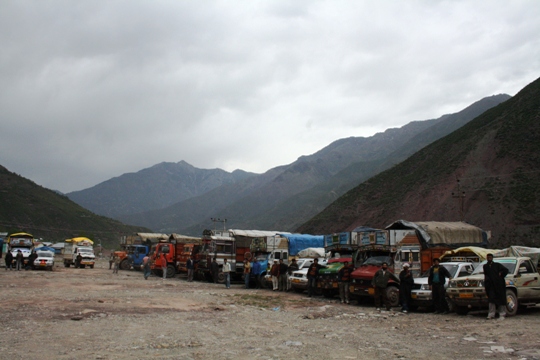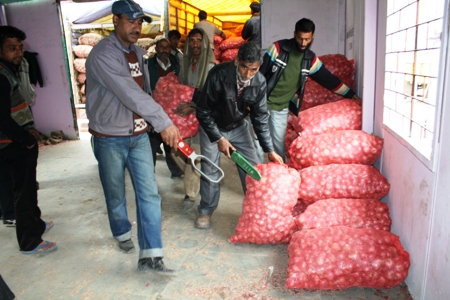Started in a hurry, the trans-LoC trade had more hurdles than pedals. Despite government promises of sorting out modalities soon, a year after the major hurdles still remain. However, the trade has survived and the funny thing is, it is growing. HAMIDULLAH DAR reports.

What began with a handful of traders exchanging a dozen truckloads of cargo in a symbolic manner, has grown to involve hundreds. But the trans-LoC trade has so many hurdles, besides major issue of unresolved modalities, that one wonders what keeps it growing.

Many traders are reluctant to call it a trade anyway. Even Chief Minister Omar Abdullah repeatedly called it a barter system, and lamented the absence of banking and communication facilities.
The five major issues of concern that were there at the beginning are still there. Neither the currency issue has been resolved nor the banking. The telecommunication ban from this side remains in effect, and the traders are still denied visits to other side.
Disputes between the trading parties have already began to surface, while a dispute resolution mechanism is nowhere in sight.
“Last year both governments (India and Pakistan) started the trade in just ten days and they had the compulsion to diffuse the tension. After that nothing has been done,” said Mubeen Shah, former chairman Kashmir Chamber of Commerce and Industries (KCCI).
“If they can start trade in 10 days, they can streamline it in just two days,” said Shah.
The traders say government lacks will to further the progress of the trade. The handicaps, like absence of banking exchange, have given rise to major problems.
“Some of our genuine traders are even being accused of Hawala trade by police as they feel discrepancy in import and export data,” says Shah. “No doubt there are security apprehensions but all of them can be addressed by starting proper banking facility.” Currently one trader is behind bars on the charges of many laundering as many more are being probed by the sleuths supposed to fight militancy.
A number of traders especially fruit growers from this side have not received anything in exchange for their exports.
“They can’t go to that place, they can’t telephone them, they can’t go to anybody for dispute resolution as there is no such authority and they don’t know how to get the money” explains Shah.
Traders have been demanding multiple permit passes for their business travels. Despite all these troubles, the surprise is that the “trade” is growing.
“Started with a handful of traders from the valley, the number of traders has swelled to 190. It is still increasing although there are many things to be done in streamlining the trade,” says Mohammad Ashraf Wani, Custodian, Trade Facilitation Centre (TFC) Salamabad, Uri.
Envisaged to open a market for pan-Kashmir products in the divided parts of Kashmir, the trade on Jhelum Valley route (Salamabad-Chakoti Road) was thrown open hurriedly after an economic blockade of the Valley by Hindu rightwing groups in Jammu raked up demands and protests for an alternative route to hill-locked Kashmir. The political compulsions fast-tracked it with the authorities and the government gave its launch a hype.
With the basic norms unaddressed, it was left for traders to sustain it. “We suffered losses at times but it was like a dream come true for us so we endured everything gladly to keep the trade going on,” complains Aijaz Ahmad Allaie, President Salamabad-Chakoti Traders Union.
Prof Nisar Ali of Kashmir University’s Economics department says the trade has not started across LoC in “true sense of word”.
“It is a symbolic trade employing in the abandoned principles and rules. Initially it was thought to provide an alternate market to the apple produced in the valley and reduce the price spread effect. But it did not click that way because of Indo-Pak political scenario.”
Ali adds that only improved political relations between the two countries can develop the trade.
“In international trade barter system has died long before and it made its resurrection in cross LoC trade. It had to be accompanied by associated facilities like storage possibilities, currency exchange and modern communication system to strengthen it but all that is missing rendering the trade a joke” Ali adds.
Having witnessed an emotional start trade between the divided parts of Kashmir was allowed for 21 commodities. The value of total exported goods from TFC Salamabad from October 21, 2008 to October 14, 2009 is (Indian) Rs 18.69 crore. These exported goods were sent in 61 consignments in 925 trucks accounting for 43084.30 quintals. However, value of 72 truck loads has not been projected by the exporters.
Traders were initially enthusiastic about finding an alternative market for the apple but statistics reveal a disturbing picture. A total of 1361. 62 quintals of apple were exported to other part of Kashmir from Salamabad upto October 14, 2009. However, bulk of it was exported in October and November last year (1092. 63 Quintals). Ironically, coconut, a fruit cultivated in south India accounted for 14554.53 quintals during the last one year with exports in two weeks of October (2009) touching 2553.44 quintals.
The highest quantity of export items has been fresh vegetables totaling 17847.90 quintals and the lowest quantity was that of saffron amounting to just 60 gms. Total weight of the goods of first two consignments was 395.57 quintals and last two consignments (on October 7 and 14, 2009) saw a total 4064.59 quintals, an increase of more than 10 times. On the import side, the total value of imported goods upto October 14, 2009 is (Pakistani) Rs 26. 5757 crores. The importers have not projected the value of goods before May 5, 2009. The number of traders on the other side of the LoC is 157. From across the LoC, Mung (green gram) is the largest imported item with 64891.87 quintals.
The item imported in least quantity is canned pineapple at 25 kgs. The imports came in 62 consignments in 1348 trucks with a total weight of 87123.35 quintals.

At Chakan Da Bagh Poonch, another cross-LoC trading point, the situation is somewhat different. The value of total export from this side is (Indian) Rs 25.79 crore, much higher than TFC Salamabad. The exports include 78600 bags of onion. Coconut forms second largest exported item at 43618 bags, miles ahead of apple of which only 294 bags were sent.
Like in Kashmir, Mung was the biggest import with 162522 bags amounting to (Pakistani) Rs 40.22 crore. Amrood (Gauva) one box worth (Pakistani) Rs 370 was quantity-wise the least imported item at Poonch. The value of total imported goods at TFC Chakan Da Bagh is Rs 49.19 crore (in Pakistani currency).
Matloob Khan, Custodian TFC Poonch minces no words in calling it an exchange of goods than trade. “It is not trade but exchange of goods which now has shrunk to three or four items while as other listed commodities have a symbolic presence. This has become a pan-India and pan-Pak trade as state- based products have almost vanished from the scene. Famous Poonch Rajmash is prominent by its absence in the trade.”
Khan admits that the trade started to improve the lot of the people of the state has not lived upto the expectations. “There should have been a seminar on this issue as to why has trade failed to percolate its benefits to the grass root level. Only a handful of traders are benefiting from the trade.”
The cross LoC trade has proved a trade of items produced outside state. “Almond is produced in the valley but hardly any of it has been exported to other side of the Kashmir. Similarly dried vegetables (2.5 kgs), carpets (12 Nos.) and wall hangings (46 Nos.) in a year speak much about its turning into trade of items from other states,” says Akhlaq Ahmad, another trader from Baramulla.
Apart from the major modalities, the inadequate infrastructure at TFC’s is adding to the trouble.
“We do not have enough storage facility to keep our goods safely in. besides the SOP (standard operational procedure) says that goods have to be unloaded within two hours and how come is it possible for 30 laborers to unload around 50 truck loads in two hours. It results in returning goods without unloading causing at least Rs 25,000 loss to the importers across the LoC,” says Allaie.
The screening of the goods is done manually and traders have to unpack their consignments. “We have to open up the boxes and bags which affects the quality of goods. Besides it is time-consuming and often results in delay to send it across,” says Allaie.
Then there are others concerns too.
Local traders allege that cross traders from Lahore and Delhi have hijacked the process. “There are some proxy traders who import and export goods in bulk and then straight away forward the same to Delhi. Also many defaulters on both the sides have attracted the attention of intelligence agencies who think that Hawala money seeps in through trade. I throw a challenge to such agencies that they should look for such people away from genuine traders,” says Allaie.
The seriousness of the two governments of India and Pakistan can be gauged from a statement of Pakistan president in February this year: “We are seriously thinking of initiation of trade across LoC to strengthen CMBs between two countries.”
Though cross-LoC trade at the time had entered its fifth month.
The cross LOC trade has stirred hopes of a major trade activity between Kashmir and Pakistan and Central Asia. “But all our hopes have been dashed, no promise has been kept,” said Mubeen Shah.















